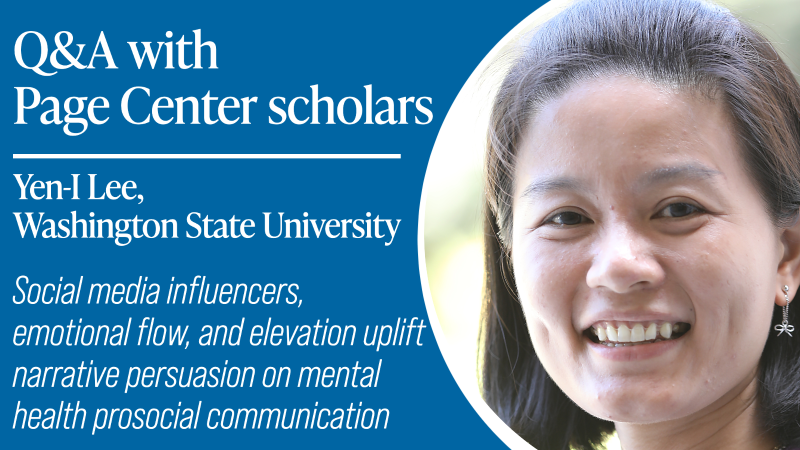Motivating prosocial behavior with the power of influencers – Scholar Q&A with Yen-I Lee
August 7, 2023 • Jonathan McVerry

Generation Z suffers from mental illness more than any other age group, according to the National Institutes of Mental Health, even more so since the COVID-19 pandemic. Research says that influencers have the power to reach this age group through social media. They can connect to their followers and potentially raise awareness of important topics, like mental health issues. A team of Page Center scholars is conducting a two-part study that will examine how narratives in videos impact online engagement, and how social media influencers can motivate young adults to take positive action toward mental health. In this Q&A, scholar Yen-I Lee, Washington State University, discusses the study and how her coauthors – Yan Jin, University of Georgia; Di Mu, Washington State University; and Michaela Gearty, University of Georgia – plan on uncovering important prosocial communication strategies. This project is part of the Center’s 2023 call for research proposals. Mu and Gearty are graduate students and first-time Page Center scholars. Professors Lee and Jin have been funded before.
How did your research team come together?
Yan Jin and I have been working together on projects since I was a graduate student at the University of Georgia. Some of my research has been looking at how messages in a campaign can help people, especially with their mental health. I have also been interested in looking at emotion, because emotion is an important key when people are viewing messages. When we saw the prosocial communication call, we had a conversation about emotion and social media influencers. We thought it would be interesting to look at how positive emotion, emotional change, and social media influencers can affect mental health communication. We are very happy to have two graduate students on this project. It’s a good opportunity to work with young and promising scholars as we work on this research.
One thing I’ve learned since starting these Q&As is that each scholar team defines “prosocial” a little differently. What’s your definition and how does it relate to this project?
For our team, prosocial communication is looking at mental health and how organizations can find better, more persuasive ways to communicate and help individuals with their issues and their well-being. For our study, we want to focus on social behavior, especially online. We want to see how people react to a narrative story about mental health from a social media influencer. How do these unconscious emotional and cognitive processes react to this narrative story? How can they further influence people to help prosocial communication behaviors, such as a first donation to an organization. We hope this research will provide ethical insights for organizations.
What is your research plan? Please walk me through the steps.
Our project has two phases. In the first one, we are going to conduct a content analysis of social media to identify the features that are related to emotional change and emotional reaction. We want to see how these features get heightened engagement on social media, such as high liking, sharing or commenting. That will help us move to the second phase of our study. We will conduct a lab experiment at the Murrow Media Mind Lab at Washington State University to test participants’ emotional and cognitive responses when viewing the narratives, including high engagement features for emotional change and emotional response to moral goodness.
We will adapt the features (from phase 1), rewrite stories and then partner with a real social media influencer. We’ll ask them to help us record the narrative. Then (in the lab) we will see real-time responses to the narrative and how it influences the decision-making outcome about helping people. In the Murrow Media Mind Lab, we can monitor people’s heart rates and their skin conductance and facial expressions. Seeing the responses in real time will help us understand the influence of the prosocial communication.
What practical actions do you foresee using once you have the data from phase 2?
From a theoretical perspective, we think our study can definitely fill the gap of what we know about narrative persuasion – why some narratives work and why some narratives do not. One key part of the study is understanding people and their unconscious emotions and responses in the moment. Emotional change is a way to help us understand why some narratives work and others don’t, and it could have a very significant role in persuasion. So, for health organizations, they can think about how to design the message and their content campaigns through a narrative story. And through these emotional features, they can reach targeted people and persuade them.
What does Page Center support mean to you and your research? How is it helping this project?
We want to thank the Page Center, because the support is really helpful, especially for the second phase of the study, taken place in the Murrow Media Mind Lab. The support helps us with lab equipment essential for the experiment, such as sensors for psychophysiology data collection, and incentives for recruiting participants who will provide real-time responses that generate theoretical and practical insights. Based on my experience, I believe the Page Center really cares about how we can help do good for individuals and society. It’s a great fit for me and my coauthors, and we are grateful for the opportunity to share our work with other scholars. We appreciate that the Page Center helps us promote our research.

